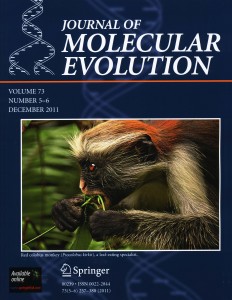 All but one of the authors of a 2013 Journal of Molecular Evolution paper have requested a partial retraction due to “erroneous data” and “scientific misconduct” on the part of the remaining author.
All but one of the authors of a 2013 Journal of Molecular Evolution paper have requested a partial retraction due to “erroneous data” and “scientific misconduct” on the part of the remaining author.
The note blames second author Michael Kolesnikov for falsifying data on the formation of ATP. According to the notice, the misconduct was confirmed by a “thorough investigation” by the Bach Institute of Biochemistry in Russia, which no longer employs Kolesnikov.
Here is the note for “Abiotic Photophosphorylation Model Based on Abiogenic Flavin and Pteridine Pigments”:
Four coauthors of this previously published work, Taisiya A. Telegina, Yulia L. Vechtomova, Andrey A. Buglak and Mikhail S. Kritsky, wish to retract Fig. 5, Fig. 6 and Table 1. The retraction involves the part of the paper claiming to show that illumination of the solution of ADP in sodium phosphate buffer (pH 7.8) in the presence of microspheres consisting of silicate and abiogenic conjugate of proteinoid with flavin and pteridine led to formation of ATP. We have no reason to believe that the other results and interpretations presented in our paper are in error. This retraction follows a thorough investigation performed at the Bach Institute of Biochemistry into the scientific misconduct of the final of the original authors of this work, Dr. Michael P. Kolesnikov, who is no longer a member of the Institute staff. The investigation found that Dr. Kolesnikov was solely responsible for the erroneous data presented in the cited figures and table that resulted in the unsubstantiated conclusions presented.
The Journal of Molecular Evolution is a member of the Committee on Publication Ethics, according to the COPE database. And yet the partial retraction goes against the organization’s guidance on the issue:
Partial retractions are not helpful because they make it difficult for readers to determine the status of the article and which parts may be relied upon.
Editor Niles Lehman explained to us his reason for going against the COPE guidelines:
This was indeed an unusual case, as four of the five authors found that the fifth author had falsified the data needed for one Figure and its corresponding Table.
Because the rest of the data was solid, in consultation with the lead author, I made the decision that the basic result of the manuscript was solid, and thus a full retraction was not appropriate. While I agree that the COPE guideline make it easier for readers to track the validity of manuscripts, in this case it was such a small fraction of the paper, it was reasonable to publish the correction as an “Erratum” and not a “Retraction”. This happens frequently in science, and I applaud the lead author for being unilaterally honest in this case.
We’ve contacted the corresponding author, as well as the Bach Institute, and will update if we hear back. We were unable to find contact information for Kolesnikov.
Hat tip: Rolf Degen
Like Retraction Watch? Consider supporting our growth. You can also follow us on Twitter, like us on Facebook, add us to your RSS reader, and sign up on our homepage for an email every time there’s a new post.
The retracted claims do not seem negligible to me. The papers seemed to have been selling some kind of artificial photosynthesis or perpetuum mobile, which apparently other journals did not buy. Plus, as Telegina is corresponding author, she is likely to be the boss here, which in turn implies the second author, Kolesnikov, did the bulk of experiments. So can we trust the rest of the paper, once his piece of science fiction was proven as such?
Why no retraction then? Is this Springer journal simply concerned of its impact factor and reputation?
A paper consists of a team, and consists of a collection of its multiple parts. If one part, or if one co-author has problems, then the whole team, and the whole paper suffer. In my belief, the correct thing for the editor to have done would have been to retract the paper, and to request the authors to rewrite it, fixing the erroneous figures/tables, and submitting for a fresh peer review.
Of note, Kolesnikov is a 66 years old person, unlikely a PhD student/postdoc.
Working in Russian academic environment myself, I would not blindly trust any investigation performed by an institute. Also, there are many papers where he and Telegina are co-authors (https://mapofscience.ru/scientist/834801/articles?clear=all).
PS. It indeed appears that he doesn’t have any e-mail (see official contacts http://www.inbi.ras.ru/info/tel-mail.inbi.html, “КОЛЕСНИКОВ Михаил Петрович”), just a phone number.